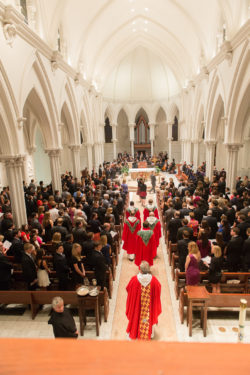By Christopher White, The Tablet’s National Correspondent

ROME – At a time when the United States is divided by the pending confirmation of Judge Brett Kavanaugh to the Supreme Court and Catholics are roiling from clerical sex abuse scandals, Msgr. Peter Vaghi urged attendees at Sunday’s annual Red Mass to seek the Holy Spirit’s healing power.
“The Spirit comes with the tenderness of a true friend and protector to save, to teach, to counsel, to strengthen, to console, to renew, to heal. Yes, to heal us,” Msgr. Vaghi said.
“Could there not be a better time, both in our Church and Nation, to benefit from the healing power of the Holy Spirit?” he asked. “It is a power that treats the anger and divisions that so need the healing touch of our God if we are to continue our respective missions with love and effectiveness in our day.”
Msgr. Vaghi, who serves as chaplain of the John Carroll Society, a Catholic professional association, served as homilist for the Red Mass, which takes its name from the red vestments worn by the celebrant to signify the fire of the Holy Spirit.
The Red Mass is celebrated each year for those working in law and government and dates back to approximately 1310 in England, following similar services in Paris, and is traditionally celebrated on the Sunday before the first Monday in October that marks the beginning of the new Supreme Court term. It’s held at St. Matthew’s Cathedral in the nation’s capital.
While the original homilist for the Mass was supposed to be Bishop John Barres of Rockville Centre, L.I., Msgr. Vaghi was announced as a replacement less than two weeks ago. Auxiliary Bishop Mario Dorsonville served as principal celebrant for the Mass, which is normally presided over by Cardinal Donald Wuerl has just returned from Rome.
Cardinal Wuerl has been under scrutiny for his handling of sex abuse cases in the 1980s and ’90s as bishop of Pittsburgh, Pa., and recently said he planned to ask the pope to accept his resignation as archbishop of Washington.
In attendance were Justices Stephen Breyer and Clarence Thomas, along with Chief Justice Roberts. Breyer is Jewish, while the others are Catholic. Also present was Justice Anthony Kennedy, whose retirement from the court this summer sparked the current fight over his replacement, along with Attorney General Jeff Sessions.
In his homily, Msgr. Vaghi extolled the “self-evident” truths referenced in the Declaration of Independence as “not changeable policies, or laws made by human beings, but cherished truths endowed to us by our Creator.”
“Only through constant prayerful study, vigilance, and personal and collective effort will the magnificent vision of our forebears remain a reality today and endure in the years to follow,” he continued.
Ahead of a Court term that is due to include cases on immigration, religious liberty, and healthcare, Msgr. Vaghi challenged Mass-goers not to forget the “unalienable rights [that] helped bring our great democratic experiment into existence and has sustained us as a Nation.”
“Could there be a better basis for an American consensus than these truths set forth in the Declaration of Independence?” he asked.
“We know that liberty, for example, cannot for long exist without truth, especially the transcendent truth of the human person. Nor is the pursuit of happiness for any one of us furthered if the life of each of us-including the least in our midst- is not protected. Life is God’s first gift to us. And I speak of life in every circumstance and condition and especially the lives of those on the periphery of society,” he continued.
He drew a parallel to the truths enumerated in the Declaration of Independence to St. John Paul II’s 1993 encyclical “Veritas Splendor,” which offered a robust defense of moral absolutes in both public and private life. Citing the encyclical, he added, “the root of modern totalitarianism is to be found in the denial of the transcendent dignity of the human person who, as the visible image of the invisible God, is therefore by his very nature the subject of rights which no one may violate-no individual, group, class, nation or state.”
Concluding his homily, Msgr. Vaghi recited the words of Pope Francis and called on the nation’s leaders to seek truth, as guided by the work of the Holy Spirit.
“Let us renew our trust in the Holy Spirit every day,” Msgr. Vaghi recounted.
“The trust that He enacts in us, He is in us, He gives us courage, confidence and peace! Let us be guided by Him, men and women of prayer, witnessing the Gospel with courage, becoming instruments in our world of God’s unity and communion.”
